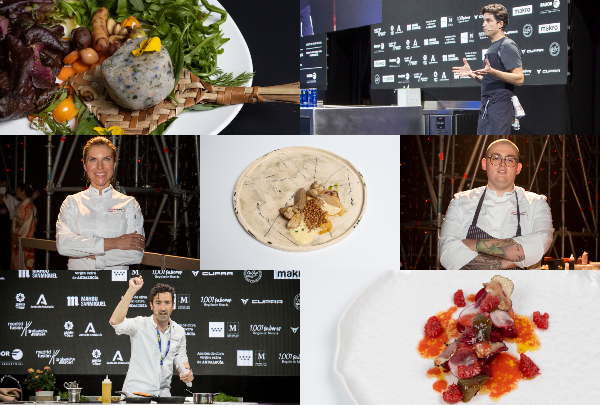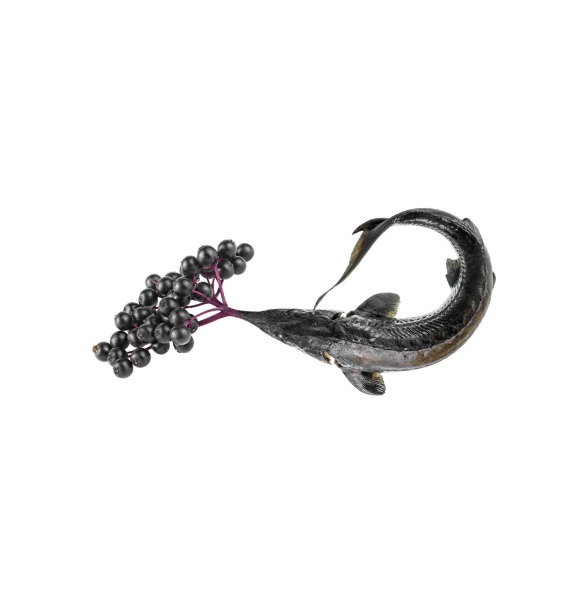News
Madrid Fusión Alimentos de España brings to-gether sources of energy in the sector to mark the beginnings of an era of hope
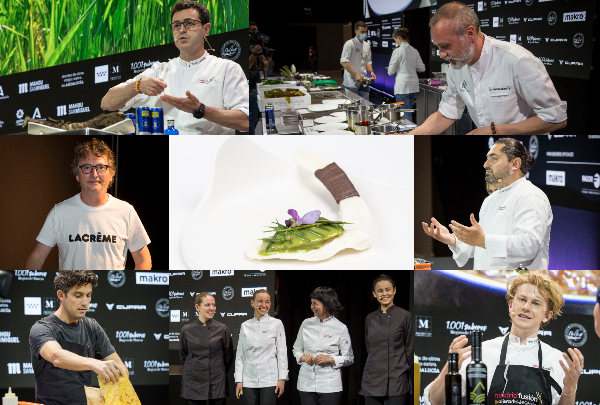
Madrid Fusión 2022 Alimentos de España will be back in January to take up the challenge of a priceless dinner with five of the world’s best chefs, which Robert De Niro has accepted to promote the congress.
“Let’s see what happened to us as an opportunity to see the world as if we were seeing it for the first time”. These words by Andoni Luis Aduriz on the last day of Madrid Fusión Alimentos de España serve as a summary of the 19th round of the world’s most influential gastronomy congress. Attendance surpassed even the most optimistic forecasts, and the number of visitors sold out the auditorium. The hospitality sector and all its satellites were filled with the desire to feel that the heart of major congresses is beating fast and furious once more.
The comeback by Madrid Fusión Alimentos de España can be demonstrated in its figures: more than 15,000 accreditations and 183 exhibitors over more than 21,000 square metres. More than 400 people at a congress with 760 ac-credited journalists, drawing less international attention due to the restrictions of the pandemic on travel from certain countries. A hugely successful event which will be continued in just under six months, when Madrid Fusión Ali-mentos de España will open its doors again in January to take up another challenge: a priceless dinner with five of the world’s best chefs, which Robert De Niro has accepted to promote the congress.
There can be no doubt that the last day of the congress was marked by the success of Javier Sanz and Juan Sahu-quillo, from Cañitas Maite (Casas-Ibáñez, Albacete). These two young friends, who trained at the Escuela de Hostelería de Toledo y Gasma, pulled off a hat-trick at the Madrid Fusión Alimentos de España 2021, never seen before in the previous 19 events. In the morning they took the Revelation Chef award, the prize for the best Joselito ham croquette first thing in the afternoon, and the National Pickles award at the end of the congress. Unexpected success for the two chefs, only 23 years old, who have known each other since the age of 5.
At an event focusing on circular gastronomy and respect for the environment, sound management of resources and the relationship of cooking with the countryside and the city, the message conveyed on the last day focused on kitchen teams and their conditions. Among others, Josep Roca and Italian chef Diego Rossi called for better work days, conditions and hours for their staff, crying out for employment sustainability well in line with the logic of the event. The teams were also showcased with the premiere of the documentary “Behind”, directed by Jorge Martínez, which moved into seven gastronomic sanctuaries to examine the day-to-day of the teams and the seconds-in-command, who “accept projects as ours, because restaurants are not ours, but the projects are”, said Juanfra Vicente, creative director at Quique Dacosta.
The lunar menu of the world’s best restaurant
Whereas on Tuesday Ignacio Echapresto (Venta Moncalvil-lo*, Daroca de Rioja) expressed his focus on biodynamics and the lunar calendar applied to the restaurant, on Wednesday it was Mauro Colagreco (Mirazur***, Menton, France), chef of the world’s best restaurant, according to the 50 Best list, who elaborated on this issue. “Now is the time to reconnect with the land and focus on the land. Don’t think we are lunatics, but monitoring lunar cycles to collect or consume this or that produce changes the experience”. Colagreco explained how he decided to focus on biodynamics during lockdown, and why he is now presenting a menu that can change all the dishes up to four times a week. Like Echapresto, Colagreco allows himself to be guided by lunar cycles – Root, Leaf, Flower and Fruit – and he also changes the perfume or the décor of the dining room. The chef was blunt: “Now the moon is our head chef”.
While the Argentinian chef reconnected with the land, Andoni Luis Aduriz upped the ante. Even though he had been a green chef from the outset (not for nothing did the congress acclaim him as Chef of the Year along with seven col-leagues), the Basque chef used the Madrid Fusión Alimentos de España stage to delve once more into beauty, the temperature of dishes, and the importance of texture.
The chef of Mugaritz** (Rentería) presented a few of the dishes on his new menu, where he continues to play around with veils and allows diners to kiss the mould of the face of a member of his team in the shape of the crockery. “Could this be the face of Mugaritz?”, he pondered.
International presence
The last day of the event also featured the Italian Diego Rossi, whose Milan “Trippa” revolutionised the concept of trattoria with respect to the product and tradition, albeit with the freedom to modernise recipes, such as his low-temperature “vitello tonnato” with syphon. German chef Björn Swanson (Faelt*, Berlin, Germany) who, during the pandemic, opened an “essential” restaurant with only four employees as a resounding success (he has already notched up a Michelin star), with no excessive pricing (89€) – because “we don’t want to serve 10% of the population"-, and Juan Sebastian Pérez (Quitu, Toledo, Ecuador), who demonstrated his country’s biodiversity and the richness of its products.
Also on the main stage on Wednesday was Pablo González Conejero (Cabaña Buenavista**, Murcia), who presented his project to retrieve autochthonous plants and vegetables, and is working alongside the Murcia Institute of Agri-cultural Research and Development (IMIDA); Juanjo Losa-da (Pablo, León), making a stand for the produce of “land and river” in León, and Sergio Manzano (A’Barra, Madrid), presenting the delights of the essence of Joselito ham, and Luis Callealta (Ciclo, Cádiz), with a talk on discarded vegetables.
Josep Roca and his applause for waiters
Josep Roca, sommelier at El Celler de Can Roca, did not really talk about wines, but he did talk about the importance of the dining room. To applause for waiters, “who were hit hardest in the sector by the pandemic”, Josep Roca em-barked upon a talk which reflected on the dining room and the concept of the waiter, describing emotion as an instrument “to improve not only the lives of teams, but also to improve the diner’s experience in the gastronomic environment”. Emotions at El Celler were worked on by psychologist Imma Puig, who “was at our weekly Tuesday meetings with the team”. “Taking care of the teams is the best investment”, he said.
In this desire to delve deeper into the world of emotions, years ago they began to study neuroscience and all disciplines that helped gain an understanding of feelings with a number of specialists. “How far do we want to go with information? Today our customer visibility is on Instagram. We have a lot of information to enable us to reach the maximum personal sensoriality …we still have a lot of ground to cover”.
The MF The Wine Edition awards
MF The Wine Edition did keep to wine, however, and finished off with the participation, among others, of David Robledo (sommelier at Ambivium*), Agustí Peris (sommelier at Refectorio Abadía Retuerta*), Rubén Pol and Oriol Castro (sommelier and chef at Disfrutar**) or Ferran Centelles (former sommelier at El Bulli), who presented the 4th “Bullipedia” Volume, the Wise Man’s Wine, with an exclusive focus on the task of sommeliers.
Two prizes were also awarded during MF The Wine Edition. The Juli Soler Award for Talent and the Future of Wine, the wine world’s answer to the Revelation Chef award, which fell to Roc Gramona (Bodegas Gramona), Lucía Fuentes (Aponiente), Álvaro Medina (Culler de Pau), Juanma Martín (Bodegas Rico Nuevo) and Paula Menéndez and Virginia García (In Wine Veritas). Tierra de Sabor also acknowledged Fuentes del Silencio (Valle del Jamuz, León) as most sustainable winery. The wine congress was rounded off by Roca, and he filled the auditorium with applause after his talk on extreme viticultures and climate change, at this last tasting session in Madrid Fusión The Wine Edition, with the chance to taste wines from fire and frost.
The MIP launches Domi Vélez
The Wednesday session also announced the proposal of Andalusian Domi Vélez as a contender for the world’s best baker, at an event to be held in Brussels in November. This 43-year old from Sevilla was one of the star attractions at the international baking contest (MIP) which, for the second time, called on fifty national and international profes-sionals to analyse the situation in the sector and present the latest trends and ideas for breadmaking, cakemaking and chocolate.
The comeback by Madrid Fusión Alimentos de España can be demonstrated in its figures: more than 15,000 accreditations and 183 exhibitors over more than 21,000 square metres. More than 400 people at a congress with 760 ac-credited journalists, drawing less international attention due to the restrictions of the pandemic on travel from certain countries. A hugely successful event which will be continued in just under six months, when Madrid Fusión Ali-mentos de España will open its doors again in January to take up another challenge: a priceless dinner with five of the world’s best chefs, which Robert De Niro has accepted to promote the congress.
There can be no doubt that the last day of the congress was marked by the success of Javier Sanz and Juan Sahu-quillo, from Cañitas Maite (Casas-Ibáñez, Albacete). These two young friends, who trained at the Escuela de Hostelería de Toledo y Gasma, pulled off a hat-trick at the Madrid Fusión Alimentos de España 2021, never seen before in the previous 19 events. In the morning they took the Revelation Chef award, the prize for the best Joselito ham croquette first thing in the afternoon, and the National Pickles award at the end of the congress. Unexpected success for the two chefs, only 23 years old, who have known each other since the age of 5.
At an event focusing on circular gastronomy and respect for the environment, sound management of resources and the relationship of cooking with the countryside and the city, the message conveyed on the last day focused on kitchen teams and their conditions. Among others, Josep Roca and Italian chef Diego Rossi called for better work days, conditions and hours for their staff, crying out for employment sustainability well in line with the logic of the event. The teams were also showcased with the premiere of the documentary “Behind”, directed by Jorge Martínez, which moved into seven gastronomic sanctuaries to examine the day-to-day of the teams and the seconds-in-command, who “accept projects as ours, because restaurants are not ours, but the projects are”, said Juanfra Vicente, creative director at Quique Dacosta.
The lunar menu of the world’s best restaurant
Whereas on Tuesday Ignacio Echapresto (Venta Moncalvil-lo*, Daroca de Rioja) expressed his focus on biodynamics and the lunar calendar applied to the restaurant, on Wednesday it was Mauro Colagreco (Mirazur***, Menton, France), chef of the world’s best restaurant, according to the 50 Best list, who elaborated on this issue. “Now is the time to reconnect with the land and focus on the land. Don’t think we are lunatics, but monitoring lunar cycles to collect or consume this or that produce changes the experience”. Colagreco explained how he decided to focus on biodynamics during lockdown, and why he is now presenting a menu that can change all the dishes up to four times a week. Like Echapresto, Colagreco allows himself to be guided by lunar cycles – Root, Leaf, Flower and Fruit – and he also changes the perfume or the décor of the dining room. The chef was blunt: “Now the moon is our head chef”.
While the Argentinian chef reconnected with the land, Andoni Luis Aduriz upped the ante. Even though he had been a green chef from the outset (not for nothing did the congress acclaim him as Chef of the Year along with seven col-leagues), the Basque chef used the Madrid Fusión Alimentos de España stage to delve once more into beauty, the temperature of dishes, and the importance of texture.
The chef of Mugaritz** (Rentería) presented a few of the dishes on his new menu, where he continues to play around with veils and allows diners to kiss the mould of the face of a member of his team in the shape of the crockery. “Could this be the face of Mugaritz?”, he pondered.
International presence
The last day of the event also featured the Italian Diego Rossi, whose Milan “Trippa” revolutionised the concept of trattoria with respect to the product and tradition, albeit with the freedom to modernise recipes, such as his low-temperature “vitello tonnato” with syphon. German chef Björn Swanson (Faelt*, Berlin, Germany) who, during the pandemic, opened an “essential” restaurant with only four employees as a resounding success (he has already notched up a Michelin star), with no excessive pricing (89€) – because “we don’t want to serve 10% of the population"-, and Juan Sebastian Pérez (Quitu, Toledo, Ecuador), who demonstrated his country’s biodiversity and the richness of its products.
Also on the main stage on Wednesday was Pablo González Conejero (Cabaña Buenavista**, Murcia), who presented his project to retrieve autochthonous plants and vegetables, and is working alongside the Murcia Institute of Agri-cultural Research and Development (IMIDA); Juanjo Losa-da (Pablo, León), making a stand for the produce of “land and river” in León, and Sergio Manzano (A’Barra, Madrid), presenting the delights of the essence of Joselito ham, and Luis Callealta (Ciclo, Cádiz), with a talk on discarded vegetables.
Josep Roca and his applause for waiters
Josep Roca, sommelier at El Celler de Can Roca, did not really talk about wines, but he did talk about the importance of the dining room. To applause for waiters, “who were hit hardest in the sector by the pandemic”, Josep Roca em-barked upon a talk which reflected on the dining room and the concept of the waiter, describing emotion as an instrument “to improve not only the lives of teams, but also to improve the diner’s experience in the gastronomic environment”. Emotions at El Celler were worked on by psychologist Imma Puig, who “was at our weekly Tuesday meetings with the team”. “Taking care of the teams is the best investment”, he said.
In this desire to delve deeper into the world of emotions, years ago they began to study neuroscience and all disciplines that helped gain an understanding of feelings with a number of specialists. “How far do we want to go with information? Today our customer visibility is on Instagram. We have a lot of information to enable us to reach the maximum personal sensoriality …we still have a lot of ground to cover”.
The MF The Wine Edition awards
MF The Wine Edition did keep to wine, however, and finished off with the participation, among others, of David Robledo (sommelier at Ambivium*), Agustí Peris (sommelier at Refectorio Abadía Retuerta*), Rubén Pol and Oriol Castro (sommelier and chef at Disfrutar**) or Ferran Centelles (former sommelier at El Bulli), who presented the 4th “Bullipedia” Volume, the Wise Man’s Wine, with an exclusive focus on the task of sommeliers.
Two prizes were also awarded during MF The Wine Edition. The Juli Soler Award for Talent and the Future of Wine, the wine world’s answer to the Revelation Chef award, which fell to Roc Gramona (Bodegas Gramona), Lucía Fuentes (Aponiente), Álvaro Medina (Culler de Pau), Juanma Martín (Bodegas Rico Nuevo) and Paula Menéndez and Virginia García (In Wine Veritas). Tierra de Sabor also acknowledged Fuentes del Silencio (Valle del Jamuz, León) as most sustainable winery. The wine congress was rounded off by Roca, and he filled the auditorium with applause after his talk on extreme viticultures and climate change, at this last tasting session in Madrid Fusión The Wine Edition, with the chance to taste wines from fire and frost.
The MIP launches Domi Vélez
The Wednesday session also announced the proposal of Andalusian Domi Vélez as a contender for the world’s best baker, at an event to be held in Brussels in November. This 43-year old from Sevilla was one of the star attractions at the international baking contest (MIP) which, for the second time, called on fifty national and international profes-sionals to analyse the situation in the sector and present the latest trends and ideas for breadmaking, cakemaking and chocolate.

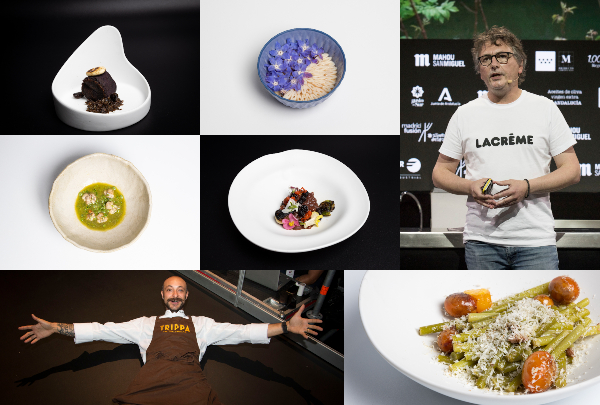
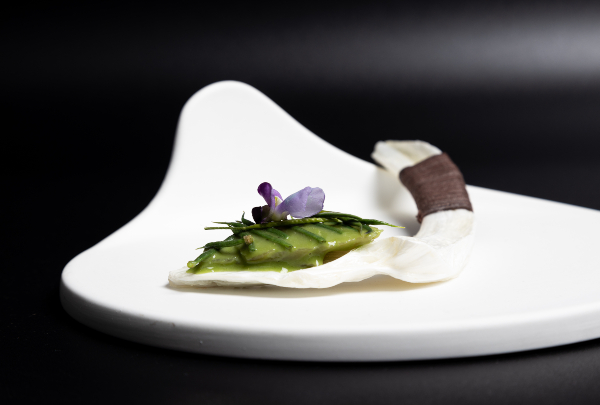
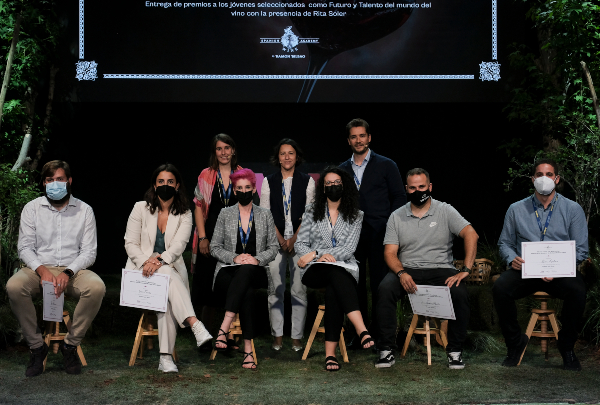
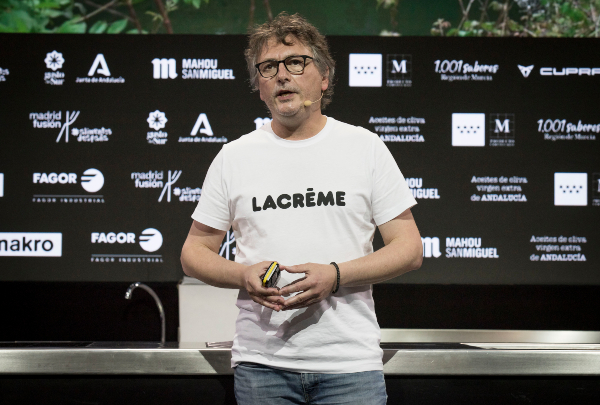
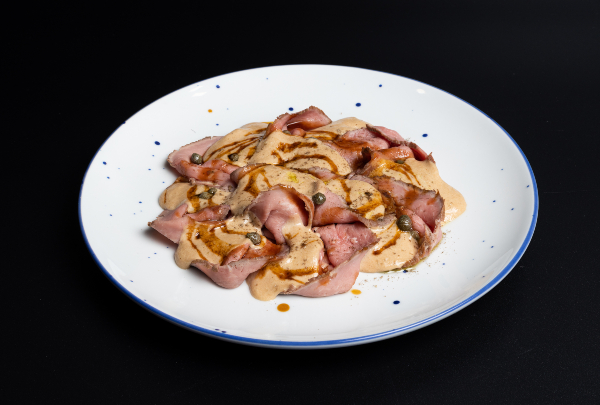
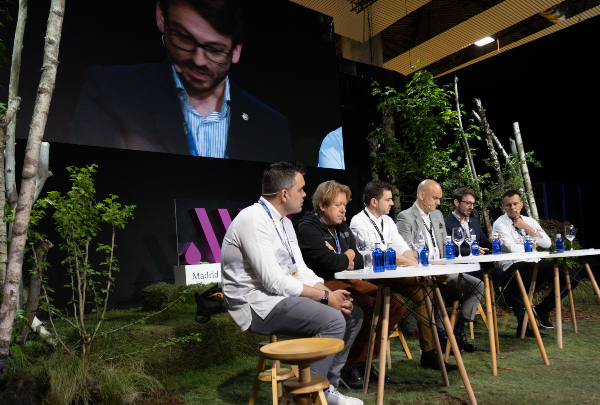
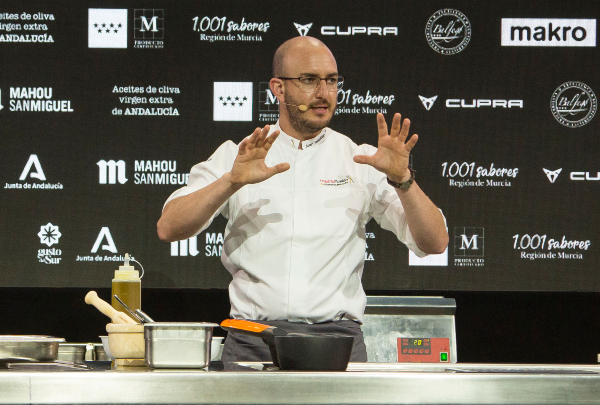
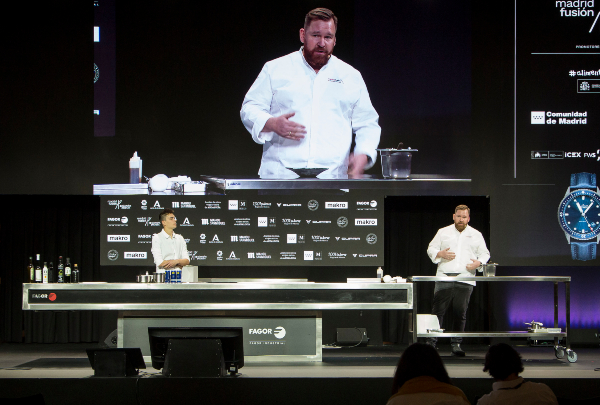
.jpg)
